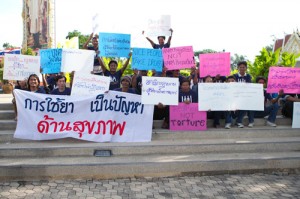[COMMENTARY] Drug Users and the Legal Framework: The Failure of the War on Drugs in Asia

Thai AIDS Treatment Action Group protesters – Photo by Rico Gustav
By Karyn Kaplan
Kaplan’s electrifying essay on the human rights of drug users in Asia is excerpted from her plenary speech given at the
International Conference on AIDS in Asia/Pacific (ICAAP), Busan, South Korea, August 27, 2011 and reprinted from the Health and Human Rights Forum.
Here in Asia, home to more than half the world’s opiate users, more than 16 million drug users and at least 6.5 million injectors, where HIV prevalence among injectors is among the highest in the world, where the HIV epidemic is largely driven by unsafe injecting practices, where less than 10% of heroin injectors are on methadone, and where injectors can access an average of just two sterile syringes per month, we lack 90% of the resources necessary to provide the
essential harm reduction services necessary for realizing the right to health. But while resources are a significant challenge, I would argue that even when we have the resources, it does not ensure access.
[NEWS] Chinese, Thai, US Groups Join to Train AIDS Activists in Human Rights
Award-winning rights advocates from China and Thailand are
joining together to train grassroots HIV/AIDS groups in human rights
skills. Their first manual, Prove It: Documenting Rights Abuses was published on World AIDS Day, December 1st. English press release (pdf) Chinese press release (pdf) Read more and download the manual/下载课本。
[REPORT] Using Buddhism in HIV/AIDS Education and Care
With some translation assistance from Asia Catalyst, Mr. Ai Khamngen from Yunnan’s Sangha Metta Project (佛光之家 foguangzhijia)won a full scholarship from the International AIDS Society to attend the International AIDS Conference in Vienna. Sangha Metta, located in Yunnan’s Sipsongpanna Tai Autonomous Prefecture, brings together Tai minority Buddhist monks, people living with HIV/AIDS, and community leaders to do AIDS prevention, sex education, and community support work. Theirs is one of the few ethnic-minority-led AIDS programs in China, and is modeled on similar projects in Thailand. Here is his slide presentation.
Please follow this link for his presentation: HIVAIDS care with Buddhism.
[REPORT] Structural Violence in a Refugee Community

By Celina Su
In 2000, I began to work with a small, community-based project called the Burmese
Refugee Project (BRP) in northwest Thailand. Using a participatory
model of community development, the BRP helps over 100 Burmese Shan refugees in
northwest Thailand access education, health, and legal services. Through this
work, I learned that refugees are the victims of what public health researchers
call structural violence–physical and mental harm that results from unjust social, economic, and political
structures. Many of the prescriptions that would treat these ailments–such as a shared wheelbarrow so
that the refugees do not have to carry 50-kilo bags of rice on their shoulders,
and for the man above, sunglasses to treat pterygium (a scar on the eyes caused
by sun damage)–fall outside typical medical practice.




